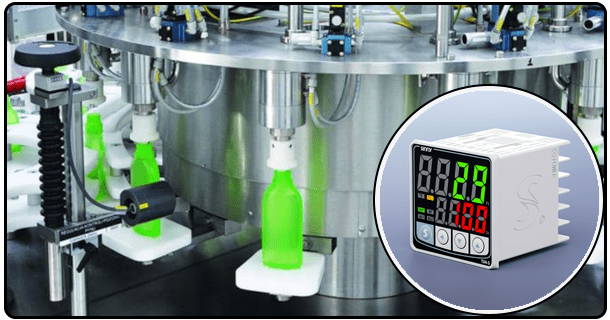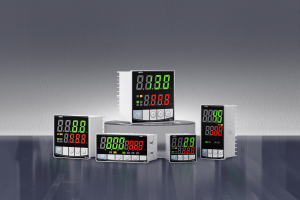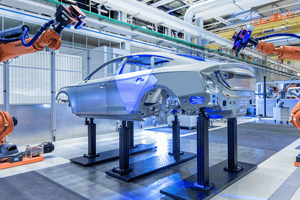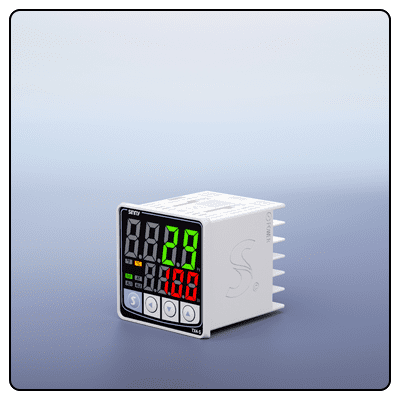Understanding PID Control in Industrial Temperature Controllers
Explore the fundamentals of PID control in industrial temperature controllers. Learn how PID controllers improve product quality, enhance energy efficiency, and ensure safety in various industries.
1. Introduction
Precision temperature regulation in industrial settings is essential to product quality and process efficiency. Proportional-integral-derivative (PID) control has become an increasingly popular approach among temperature controllers to meet this objective. This article will investigate the fundamentals, key features, applications, and benefits associated with PID control and any benefits for industrial temperature controllers.
What is PID Control?
PID control, commonly referred to as Proportional Integral and Derivative control (PID for short), is an innovative feedback mechanism used in control systems to achieve desired setpoints by adjusting process variables. PID utilizes three control actions - proportional integral and differential - each serving its function for accurate temperature regulation.
Proportional Control: Proportional control regulates output proportionally according to any deviation between setpoint temperature and actual temperature, helping minimize but not wholly avoid mistakes while optimizing operations efficiency. It keeps errors to an absolute minimum while optimizing operational efficiencies simultaneously.
Integral Control: Integral control works by adding up errors over time and then making output adjustments to reduce them, helping break a steady state that proportional control alone cannot address.
Derivative Control: Derivative controls predict future errors based on their rate of change and can help dampen system response while decreasing overshoot for more stable control.
How PID Controllers Work
PID controllers continuously calculate error values and use proportional, integral, and derivative actions to adjust control output accordingly. By doing this, they ensure process variables remain close to their setpoint - for instance, by employing sensors for temperature measurements and actuators for heating/cooling elements to measure output accordingly and adjust it.
Key Features of PID Controllers
Precision and Accuracy: PID controllers offer precise temperature regulation to maintain product quality across production runs and ensure consistency from run to run.
Flexibility: They quickly adapt to various processes and applications, making them suitable for multiple industrial settings.
Stability: Derivative action can assist a control system in stabilization by minimizing overshoot and oscillations and their own overshoot/oscillation events.
Modern PID controllers feature user-friendly interfaces with digital displays and user-friendly controls that make setting changes simple for operators to manage and tweak settings with minimal fuss.
Remote Monitoring and Control: Many PID controllers offer remote monitoring and control features, enabling operators to control temperature settings remotely from far away.
2. Applications in Various Industries
Pharmaceutical applications require precise temperature regulation to preserve drug stability and efficacy; PID controllers enable manufacturers and warehouse owners to do this during production and storage operations.
Temperature Control in Food Processing: To ensure both product safety and quality, keeping temperatures within safe parameters during all of the food production stages - cooking, cooling, and storage processes alike - is of utmost importance for successful finished goods production. PID controllers help achieve this task while at the same time helping ensure regulatory compliance for each food item manufactured or purchased.
Chemical Manufacturing: PID controllers are indispensable in chemical manufacturing to maintain consistent reactions and product quality while meeting optimal conditions for individual chemical processes.
HVAC Systems: Heating, Ventilating, and Air Conditioning (HVAC) systems use PID controllers to regulate indoor climates for comfort and efficiency in residential, commercial, and industrial settings. PID controllers help create comfortable temperatures within homes, workplaces, and industries.
PID Controller Benefits
Increased Product Quality: Consistent temperature regulation helps guarantee processes occur under ideal conditions, improving product quality.
Energy Efficiency: Optimizing temperature controls reduces energy use, leading to cost savings and im environmental footprint.
Safety: PID controllers help safeguard equipment and processes against overheating or temperature-related risks by monitoring temperatures to eliminate hazards such as overheating or temperature extremes.
PID controllers help companies reduce production costs while improving operational efficiencies to lower production costs and boost profitability, leading to reduced production expenses and more significant profit for manufacturers.
3. Future Trends in PID Control Technology
Advancements in Digital Controllers: With IoT (Internet of Things) and intelligent systems becoming ever more advanced, their combination with PID control technology enables real-time monitoring, data analysis, and predictive maintenance, which increases efficiency and reliability, thereby revolutionizing temperature control systems.
Miniaturization: PID controllers designed with smaller, more effective mechanisms are now being manufactured specifically to meet the demands of modern industrial applications. These compact devices offer the same precision and control found in larger systems - perfect for space-constrained applications!
Sustainability: In light of increasing global environmental concerns, more consideration has been paid to designing PID control solutions with less of an ecological footprint in mind. Sustainable systems help minimize energy use and emissions for a greener tomorrow.

4. Conclusion
PID control is an integral feature of industrial temperature controllers that ensures precise temperature regulation. By integrating proportional, integral, and derivative actions to achieve long-term control - and contributing to improved product quality, energy efficiency savings, safety precautions, reduced operational expenses, and overall more cost-effective operations overall - PID controllers continue to advance over time, providing even more advantages for industrial processes.
FAQ
1. What Are PID Controllers Used for in Industrial Temperature Controllers? PID controls refers to an adjustable feedback mechanism which uses proportional, integral and derivative actions to maintain an ideal setpoint by altering process variables to maintain it accurately and with stability for temperature regulation purposes.
2. How Do PID Controllers Operate? PID controllers work by constantly calculating error values and applying proportional, integral, and derivative actions as appropriate to adjust output, ensuring process variables remain close to their setpoint values.
3. What are the key characteristics of PID controllers?
PID controllers offer many desirable characteristics, including precision, accuracy, flexibility, stability, user-friendly interfaces, and remote monitoring and control capabilities.
4. What industries use PID controllers? Pharmaceutical, food & beverage, chemical manufacturing, and HVAC systems rely heavily on PID controllers to maintain optimal temperatures in their environments.
5. What are some significant trends in PID control technology? Mes Trends that stand out include enhanced digital controllers, integration of IoT solutions and miniaturization, creating of energy-efficient solutions, and introducing sustainable developments.
- What Are Industrial Temperature Controllers, Their Types, Benefits & Applications
- Top 20 Brands of Industrial Temperature Controllers






















